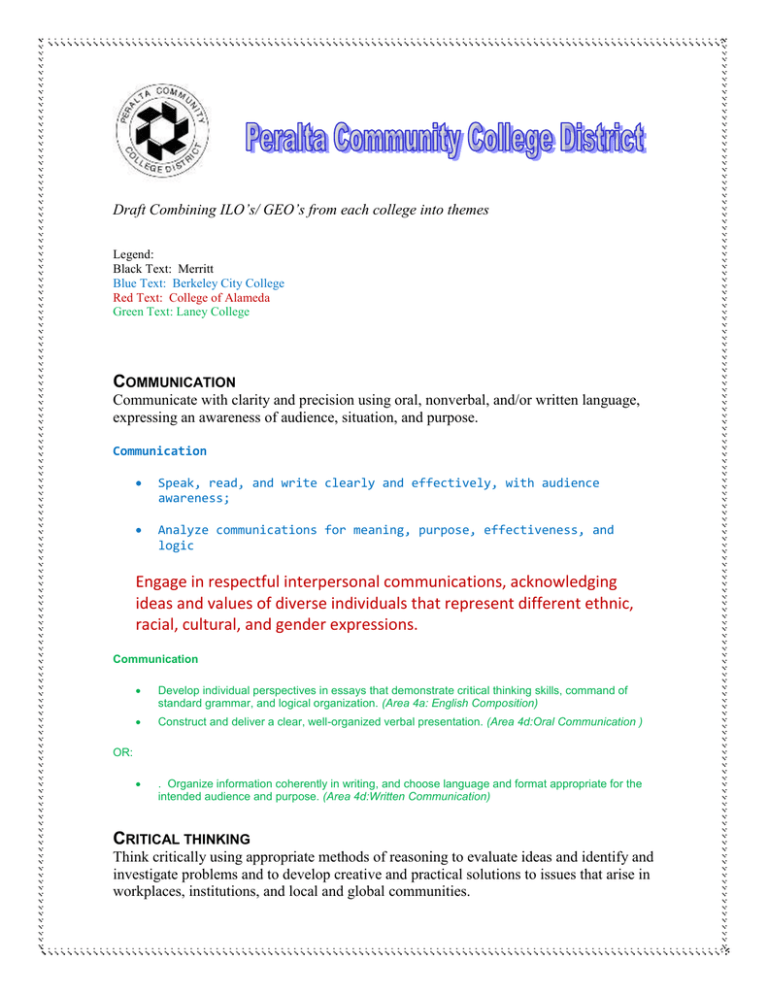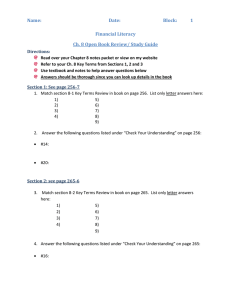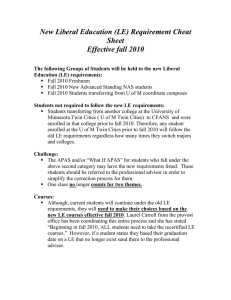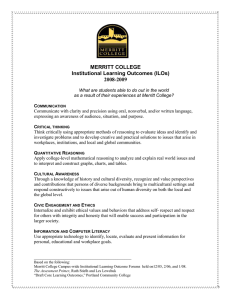ILO s combined document BCC COA Merritt laney
advertisement

Draft Combining ILO’s/ GEO’s from each college into themes Legend: Black Text: Merritt Blue Text: Berkeley City College Red Text: College of Alameda Green Text: Laney College COMMUNICATION Communicate with clarity and precision using oral, nonverbal, and/or written language, expressing an awareness of audience, situation, and purpose. Communication Speak, read, and write clearly and effectively, with audience awareness; Analyze communications for meaning, purpose, effectiveness, and logic Engage in respectful interpersonal communications, acknowledging ideas and values of diverse individuals that represent different ethnic, racial, cultural, and gender expressions. Communication Develop individual perspectives in essays that demonstrate critical thinking skills, command of standard grammar, and logical organization. (Area 4a: English Composition) Construct and deliver a clear, well-organized verbal presentation. (Area 4d:Oral Communication ) . Organize information coherently in writing, and choose language and format appropriate for the intended audience and purpose. (Area 4d:Written Communication) OR: CRITICAL THINKING Think critically using appropriate methods of reasoning to evaluate ideas and identify and investigate problems and to develop creative and practical solutions to issues that arise in workplaces, institutions, and local and global communities. Critical Thinking Identify a problem/argument, Isolate facts related to arguments, Generate multiple solutions to problems, Predict consequences, and use evidence and sound reasoning to justify well-informed positions Solve problems and make decisions in life and work using critical thinking, quantitative reasoning, community resources, and civic engagement Critical Thinking and Information Literacy Solve quantitative problems using numerical, graphical, and algebraic methods. (Area 4b: Mathematics) Locate and cite appropriately information from a variety of sources (books, databases, internet, and primary sources) in various formats (print, online, and multimedia); evaluate information for relevance and reliability, and incorporate it effectively into written work. (Information Competency) QUANTITATIVE REASONING Apply college-level mathematical reasoning to analyze and explain real world issues and to interpret and construct graphs, charts, and tables. Computational Skills Master college-level computational concepts and apply them to concrete problems; Demonstrate algorithmic competence appropriate to multiple levels CULTURAL AWARENESS Through a knowledge of history and cultural diversity, recognize and value perspectives and contributions that persons of diverse backgrounds bring to multicultural settings and respond constructively to issues that arise out of human diversity on both the local and the global level. Self-Awareness and Interpersonal Skills Analyze own actions and perspectives of other persons and work effectively with others in groups Exhibit aesthetic reflection to promote, participate and contribute to human development, expression, creativity, and curiosity. Breadth/Global Awareness Apply the principles, concepts, and/or methods of the natural sciences to everyday life. (Area 1: Natural Sciences) Critically analyze personal experiences within the context of historical, cultural, and environmental phenomena. (Area 2: Social and Behavioral Sciences) Investigate and appreciate the fine arts and humanities, including the cultural and artistic perspectives of people of various cultures and times. (Area 3: Humanities) Critically evaluate the historical and contemporary experiences of African Americans, Mexican/Latino Americans, Asian Pacific Americans, or Native Americans using interdisciplinary approaches. (Area 5: Ethnic Studies) CIVIC ENGAGEMENT AND ETHICS Internalize and exhibit ethical values and behaviors that address self- respect and respect for others with integrity and honesty that will enable success and participation in the larger society. Ethics and Personal Responsibility Analyze consequences of actions taken and their impact on society and self; Demonstrate collaborative involvement in community interests Global Awareness & Valuing Diversity Identify and explain diverse customs, beliefs, and lifestyles, as well as cultural, historical, and geographical issues that shape perceptions Accept personal, civic, social and environmental responsibility in order to be a productive local and global community member. Ethics and Civic Responsibility Demonstrate an increased awareness of ethical behavior, civic and social responsibilities locally, nationally, and globally. (Ethics/Citizenship) INFORMATION AND COMPUTER LITERACY Use appropriate technology to identify, locate, evaluate and present information for personal, educational and workplace goals. Information Competency Find, evaluate, use, and communicate information in all its various formats; Demonstrate library literacy, research methodology, and technological literacy Use technology and written and oral communication to discover, develop, and relate critical ideas in multiple environments. Demonstrate proficiency in using a computer and computer applications, including the Internet, to accomplish personal, academic, and/or professional tasks. (Area 4c: Computer Literacy) ___________________________________ MERRITT COLLEGE Institutional Learning Outcomes (ILOs) 2008-2009 What are students able to do out in the world as a result of their experiences at Merritt College? Based on the following: Merritt College Campus-wide Institutional Learning Outcome Forums held on12/05, 2/06, and 1/08. The Assessment Primer, Ruth Stielh and Les Lewchuk “Draft Core Learning Outcomes,” Portland Community College COLLEGE OF ALAMEDA MISSION ~VISION~INSTITUTIONAL LEARING OUTCOMES Vision We are a diverse, supportive, empowering learning community for seekers of knowledge. We are committed to providing a creative, ethical and inclusive environment in which students develop their abilities as thinkers, workers and citizens of the world. Mission To serve the educational needs of its diverse community by providing comprehensive and flexible programs and resources that empowers students to achieve their goals. Laney College General Education Outcomes Laney College General Education Outcomes (Organized by GE Requirement) March 2008 Students who complete the general education program for an AA or AS degree at Laney College will be able to: Area 1: Natural Sciences Apply the principles, concepts, and/or methods of the natural sciences to everyday life. Area 2: Social and Behavioral Sciences Critically analyze personal experiences within the context of historical, cultural, and environmental phenomena. Area 3: Humanities Investigate and appreciate the fine arts and humanities, including the cultural and artistic perspectives of various cultures and times. Area 4a: English Composition Develop individual perspectives in essays that demonstrate critical thinking skills, command of standard grammar, and logical organization. Information Competency (assessed with English Composition) Locate and cite appropriately information from a variety of sources (books, databases, internet, and primary sources) in various formats (print, online, and multimedia); evaluate information for relevance and reliability, and incorporate it effectively into written work. Area 4b: Mathematics Solve quantitative problems using numerical, graphical, and algebraic methods. Area 4c: Computer Literacy Demonstrate proficiency in using a computer and computer applications, including the Internet, to accomplish personal, academic, and/or professional tasks. Area 4d: Oral Communication Construct and deliver a clear, well-organized verbal presentation. OR: Area 4d: Written Communication Organize information coherently in writing, and choose language and format appropriate for the intended audience and purpose. OR: Area 4d: Literature Read critically and analyze various literary genres. Area 5: Ethnic Studies Critically evaluate the historical and contemporary experiences of African Americans, Mexican/Latino Americans, Asian Pacific Americans, or Native Americans using interdisciplinary approaches. Ethics/Citizenship Demonstrate an increased awareness of ethical behavior, civic and social responsibilities locally, nationally, and globally. Legend: Black Text: Merritt Blue Text: Berkeley City College Red Text: College of Alameda Green Text: Laney College PLAN & PRODUCE A PRODUCT Position paper Proposal Map Plan Article White paper Piece of art Essay Story Flow chart Journal entry Program Flow Chart Model Graphic Mind map Summary Annotated bibliography Letter to the editor Script Photograph Documentary film News copy Game Display PERFORM TAKE A TEST PROBLEM SOLVE PARTICIPATE Skill Skill Set Interaction Multiple Choice True/False Fill-in ESSAY Identify a problem State a problem Formulate question Recommend solutions Defend recommendations Document process Assess COMPILE TEACH OTHERS Portfolio E-file Skill sets PRESENT Internship Practicum Lab Experiment Project Community Service Task Teamwork Speech Video/Film Animation Drama Story Tutor Train Demonstrate Assess/critique Give feedback Guide Practice Reading Poster Debate Song Pod-cast



